The WORST episodes of TED Talks
Every episode of TED Talks ever, ranked from worst to best by thousands of votes from fans of the show. The worst episodes of TED Talks!
TED is a nonprofit devoted to Ideas Worth Spreading. It started out (in 1984) as a conference bringing together people from three worlds: Technology, Entertainment, Design. TEDTalks began as a simple attempt to share what happens at TED with the world. Under the moniker "ideas worth spreading," talks were released online. They rapidly attracted a global audience in the millions. Indeed, the reaction was so enthusiastic that the entire TED website has been reengineered around TEDTalks, with the goal of giving everyone on-demand access to the world's most inspiring voices. [TED-Ed and TEDx are separate TVDB series and should NOT be listed here. Episode ordering and dates are sourced from YouTube.]
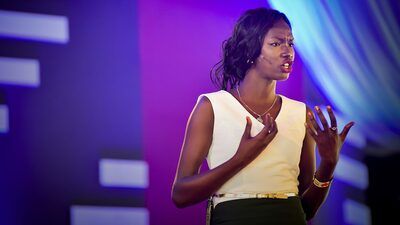
#1 - Mary Maker: Why I fight for the education of refugee girls (like me)
Season 2018 - Episode 218 - Aired 8/15/2018
After fleeing war-torn South Sudan as a child, Mary Maker found security and hope in the school at Kenya's Kakuma Refugee Camp. Now a teacher of young refugees herself, she sees education as an essential tool for rebuilding lives — and empowering a generation of girls who are too often denied entrance into the classroom. "For the child of war, an education can turn their tears of loss into a passion for peace," Maker says.
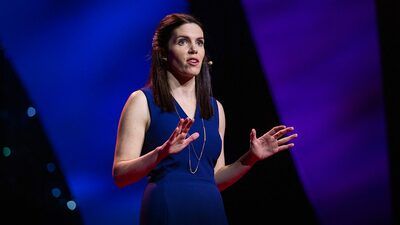
#2 - Elizabeth Lyle: How to break bad management habits before they reach the next generation of leaders
Season 2019 - Episode 2 - Aired 1/3/2019
Companies are counting on their future leaders to manage with more speed, flexibility and trust than ever before. But how can middle managers climb the corporate ladder while also challenging the way things have always been done? Leadership expert Elizabeth Lyle offers a new approach to breaking the rules while you're on your way up, sharing creative ways organizations can give middle managers the space and coaching they need to start leading differently.
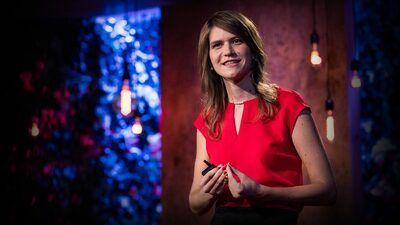
#3 - Lýdia Machová: The secrets of learning a new language
Season 2019 - Episode 3 - Aired 1/4/2019
Want to learn a new language but feel daunted or unsure where to begin? You don't need some special talent or a "language gene," says Lýdia Machová. In an upbeat, inspiring talk, she reveals the secrets of polyglots (people who speak multiple languages) and shares four principles to help unlock your own hidden language talent -- and have fun while doing it.
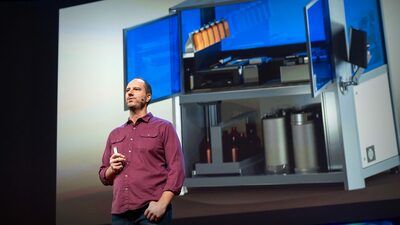
#4 - Dan Gibson: How to build synthetic DNA and send it across the internet
Season 2018 - Episode 210 - Aired 7/11/2018
Biologist Dan Gibson edits and programs DNA, just like coders program a computer. But his "code" creates life, giving scientists the power to convert digital information into biological material like proteins and vaccines. Now he's on to a new project: "biological transportation," which holds the promise of beaming new medicines across the globe over the internet. Learn more about how this technology could change the way we respond to disease outbreaks and enable us to download personalized prescriptions in our homes.
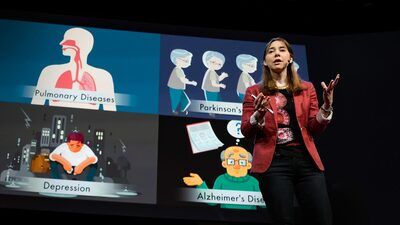
#5 - Dina Katabi: A new way to monitor vital signs (that can see through walls)
Season 2018 - Episode 211 - Aired 7/12/2018
At MIT, Dina Katabi and her team are working on a bold new way to monitor patients' vital signs in a hospital (or even at home), without wearables or bulky, beeping devices. Bonus: it can see through walls. In a mind-blowing talk and demo, Katabi previews a system that captures the reflections of signals like Wi-Fi as they bounce off people, creating a reliable record of vitals for healthcare workers and patients. And in a brief Q&A with TED curator Helen Walters, Katabi discusses safeguards being put in place to prevent people from using this tech to monitor somebody without their consent.
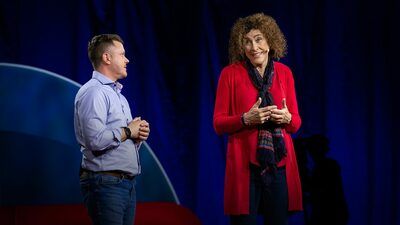
#6 - Paula Stone Williams and Jonathan Williams: The story of a parent's transition and a son's redemption
Season 2019 - Episode 4 - Aired 1/7/2019
Paula Stone Williams knew from a young age that she was transgender. But as she became a parent and prominent evangelical pastor, she feared that coming out would mean losing everything. In this moving, deeply personal talk, Paula and her son Jonathan Williams share what Paula's transition meant for their family -- and reflect on their path to redemption. As Jonathan says: "I cannot ask my father to be anything other than her true self."
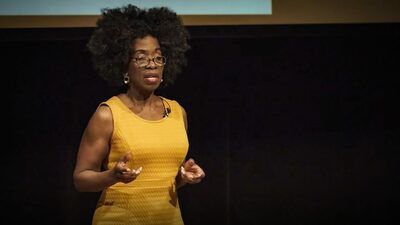
#7 - Elizabeth White: An honest look at the personal finance crisis
Season 2018 - Episode 212 - Aired 7/12/2018
Millions of baby boomers are moving into their senior years with empty pockets and declining choices to earn a living. And right behind them is a younger generation facing the same challenges. In this deeply personal talk, author Elizabeth White opens up an honest conversation about financial trouble and offers practical advice for how to live a richly textured life on a limited income.

#8 - Lili Haydn: "The Last Serenade"
Season 2018 - Episode 213 - Aired 7/13/2018
In a stirring, emotional performance, violinist Lili Haydn plays a selection from her musical "The Last Serenade."
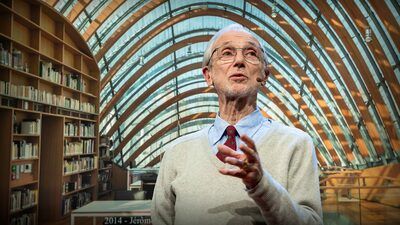
#9 - Renzo Piano: The genius behind some of the world's most famous buildings
Season 2018 - Episode 214 - Aired 7/13/2018
Legendary architect Renzo Piano — the mind behind such indelible buildings as The Shard in London, the Centre Pompidou in Paris and the new Whitney Museum of Art in New York City — takes us on a stunning tour through his life's work. With the aid of gorgeous imagery, Piano makes an eloquent case for architecture as the answer to our dreams, aspirations and desire for beauty. "Universal beauty is one of the few things that can change the world," he says. "This beauty will save the world. One person at a time, but it will do it."
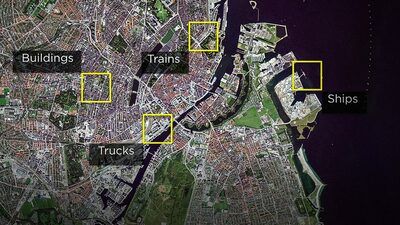
#10 - Will Marshall: The mission to create a searchable database of Earth's surface
Season 2018 - Episode 215 - Aired 7/16/2018
What if you could search the surface of the Earth the same way you search the internet? Will Marshall and his team at Planet use the world's largest fleet of satellites to image the entire Earth every day. Now they're moving on to a new project: using AI to index all the objects on the planet over time — which could make ships, trees, houses and everything else on Earth searchable, the same way you search Google. He shares a vision for how this database can become a living record of the immense physical changes happening across the globe. "You can't fix what you can't see," Marshall says. "We want to give people the tools to see change and take action."
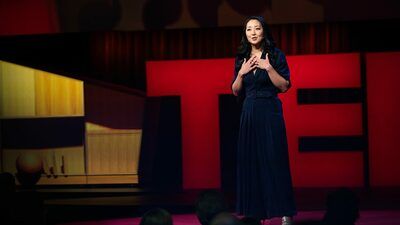
#11 - Rebeca Hwang: The power of diversity within yourself
Season 2018 - Episode 216 - Aired 7/17/2018
Rebeca Hwang has spent a lifetime juggling identities — Korean heritage, Argentinian upbringing, education in the United States — and for a long time she had difficulty finding a place in the world to call home. Yet along with these challenges came a pivotal realization: that a diverse background is a distinct advantage in today's globalized world. In this personal talk, Hwang reveals the endless benefits of embracing our complex identities — and shares her hopes for creating a world where identities aren't used to alienate but to bring people together instead.
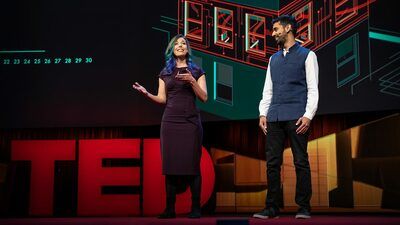
#12 - Kashmir Hill and Surya Mattu: What your smart devices know (and share) about you
Season 2018 - Episode 217 - Aired 7/18/2018
Once your smart devices can talk to you, who else are they talking to? Kashmir Hill and Surya Mattu wanted to find out — so they outfitted Hill's apartment with 18 different internet-connected devices and built a special router to track how often they contacted their servers and see what they were reporting back. The results were surprising — and more than a little bit creepy. Learn more about what the data from your smart devices reveals about your sleep schedule, TV binges and even your tooth-brushing habits — and how tech companies could use it to target and profile you. (This talk contains mature language.)
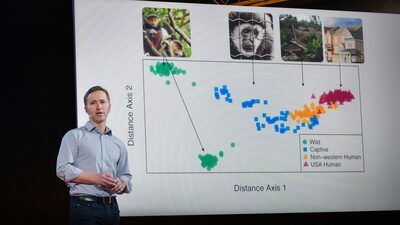
#13 - Dan Knights: How we study the microbes living in your gut
Season 2018 - Episode 209 - Aired 7/10/2018
There are about a hundred trillion microbes living inside your gut — protecting you from infection, aiding digestion and regulating your immune system. As our bodies have adapted to life in modern society, we've started to lose some of our normal microbes; at the same time, diseases linked to a loss of diversity in microbiome are skyrocketing in developed nations. Computational microbiologist Dan Knights shares some intriguing discoveries about the differences in the microbiomes of people in developing countries compared to the US, and how they might affect our health. Learn more about the world of microbes living inside you — and the work being done to create tools to restore and replenish them.

#14 - Halima Aden: How I went from child refugee to international model
Season 2018 - Episode 219 - Aired 8/30/2018
Halima Aden made history when she became the first hijab-wearing model on the cover of Vogue magazine. Now she returns to Kenya's Kakuma Refugee Camp — where she was born and lived until the age of seven — to share an inspiring message about what she's learned on the path from child refugee to international model.
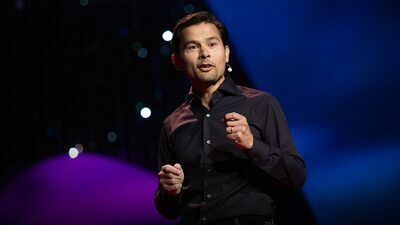
#15 - Mikhail Zygar: What the Russian Revolution would have looked like on social media
Season 2018 - Episode 220 - Aired 7/18/2018
History is written by the victors, as the saying goes — but what would it look like if it was written by everyone? Journalist and TED Fellow Mikhail Zygar is on a mission to show us with Project1917, a "social network for dead people" that posts the real diaries and letters of more than 3,000 people who lived during the Russian Revolution. By showing the daily thoughts of the likes of Lenin, Trotsky and many less celebrated figures, the project sheds new light on history as it once was — and as it could have been. Learn more about this digital retelling of the past as well as Zygar's latest project about the transformative year of 1968.
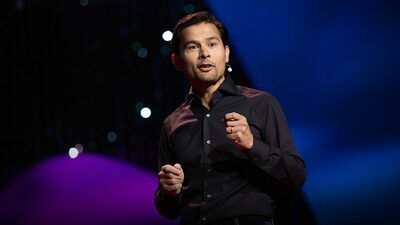
#16 - Martin Danoesastro: What are you willing to give up to change the way we work?
Season 2019 - Episode 5 - Aired 1/8/2019
What does it take to build the fast, flexible, creative teams needed to challenge entrenched work culture? For transformation expert Martin Danoesastro, it all starts with one question: "What are you willing to give up?" He shares lessons learned from companies on both sides of the innovation wave on how to structure your organization so that people at all levels are empowered to make decisions fast and respond to change.
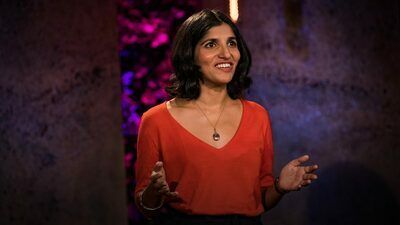
#17 - Chiki Sarkar: How India's smartphone revolution is creating a new generation of readers and writers
Season 2019 - Episode 6 - Aired 1/8/2019
India has the second largest population of any country in the world -- yet it has only 50 decent bookstores, says publisher Chiki Sarkar. So she asked herself: How do we get more people reading books? Find out how Sarkar is tapping into India's smartphone revolution to create a new generation of readers and writers in this fun talk about a fresh kind of storytelling.
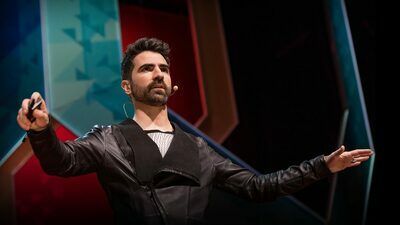
#18 - Renzo Vitale: What should electric cars sound like?
Season 2019 - Episode 7 - Aired 1/9/2019
Electric cars are extremely quiet, offering some welcome silence in our cities. But they also bring new dangers, since they can easily sneak up on unsuspecting pedestrians. What kind of sounds should they make to keep people safe? Get a preview of what the future may sound like as acoustic engineer and musician Renzo Vitale shows how he's composing a voice for electric cars.
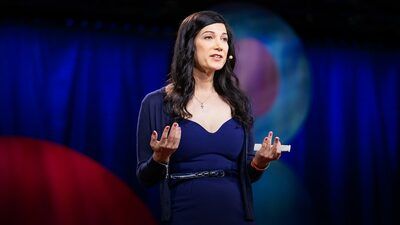
#19 - Karissa Sanbonmatsu: The biology of gender, from DNA to the brain
Season 2019 - Episode 8 - Aired 1/10/2019
How exactly does gender work? It's not just about our chromosomes, says biologist Karissa Sanbonmatsu. In a visionary talk, she shares new discoveries from epigenetics, the emerging study of how DNA activity can permanently change based on social factors like trauma or diet. Learn how life experiences shape the way genes are expressed -- and what that means for our understanding of gender.
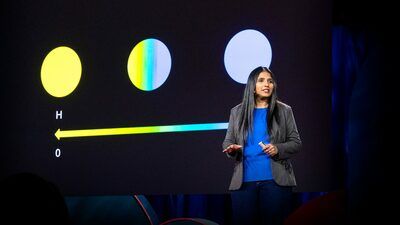
#20 - Shohini Ghose: A beginner's guide to quantum computing
Season 2019 - Episode 9 - Aired 1/11/2019
A quantum computer isn't just a more powerful version of the computers we use today; it's something else entirely, based on emerging scientific understanding -- and more than a bit of uncertainty. Enter the quantum wonderland with TED Fellow Shohini Ghose and learn how this technology holds the potential to transform medicine, create unbreakable encryption and even teleport information.
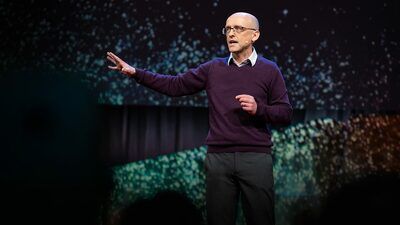
#21 - Stephen Webb: Where are all the aliens?
Season 2018 - Episode 221 - Aired 7/19/2018
The universe is incredibly old, astoundingly vast and populated by trillions of planets — so where are all the aliens? Astronomer Stephen Webb has an explanation: we're alone in the universe. In a mind-expanding talk, he spells out the remarkable barriers a planet would need to clear in order to host an extraterrestrial civilization — and makes a case for the beauty of our potential cosmic loneliness. "The silence of the universe is shouting, 'We're the creatures who got lucky,'" Webb says.
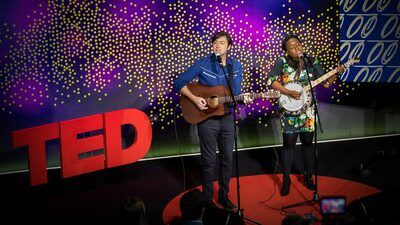
#22 - Boy Girl Banjo: "Dead Romance"
Season 2018 - Episode 222 - Aired 7/20/2018
Acoustic duo Anielle Reid and Matthew Brookshire (playing together as Boy Girl Banjo) take the TED stage to perform their original song "Dead Romance," weaving together the sounds of Americana folk music and modern pop.
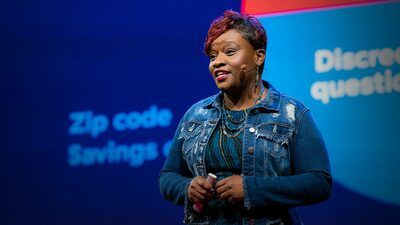
#23 - Tamekia MizLadi Smith: How to train employees to have difficult conversations
Season 2018 - Episode 223 - Aired 7/20/2018
It's time to invest in face-to-face training that empowers employees to have difficult conversations, says Tamekia MizLadi Smith. In a witty, provocative talk, Smith shares a workplace training program called "I'm G.R.A.C.E.D." that will inspire bosses and employees alike to communicate with compassion and respect. Bottom line: always let people know why their work matters.
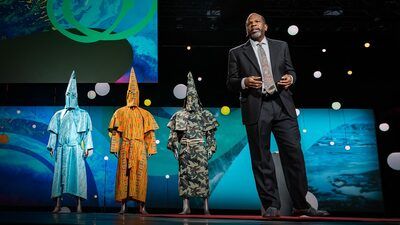
#24 - Paul Rucker: The symbols of systemic racism -- and how to take away their power
Season 2018 - Episode 195 - Aired 6/26/2018
Multidisciplinary artist and TED Fellow Paul Rucker is unstitching the legacy of systemic racism in the United States. A collector of artifacts connected to the history of slavery — from branding irons and shackles to postcards depicting lynchings — Rucker couldn't find an undamaged Ku Klux Klan robe for his collection, so he began making his own. The result: striking garments in non-traditional fabrics like kente cloth, camouflage and silk that confront the normalization of systemic racism in the US. "If we as a people collectively look at these objects and realize that they are part of our history, we can find a way to where they have no more power over us," Rucker says. (This talk contains graphic images.)
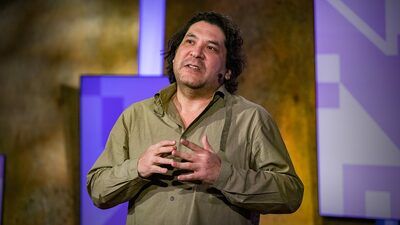
#25 - Gastón Acurio: Can home cooking change the world?
Season 2018 - Episode 187 - Aired 6/18/2018
When Gastón Acurio started his now world-famous restaurant Astrid & Gastón in the 1990s, no one suspected that he would elevate the Peruvian home-cooking he grew up with to haute cuisine. Nearly thirty years and a storied career later, the chef wants the rest of us to embrace our culinary roots and transform the world with the meals we prepare each day. (In Spanish with English subtitles)